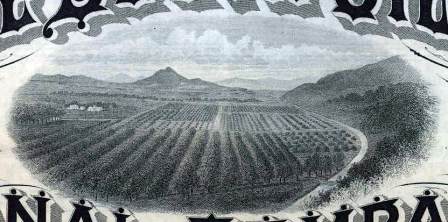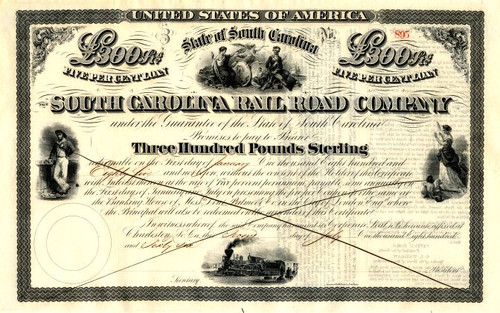Beautifully engraved certificate from the South Gila Canal Company issued in 1892. This historic document was printed by the Franklin Banknote Company and has an ornate border around it with a vignette of orchards with irrigation canal. This item is hand signed by the Company's President ( O. F. Thornton )and Secretary ( C. L. Montgomery ) and is over 110 years old. 
Certificate Vignette Below is a transmittal regarding the Canal: Hon. CHARLES CURTIS, Of the committee on Indian Affairs, House of Representatives. -------------------------------------------------------------------------------- DEPARTMENT OF THE INTERIOR, OFFICE OF INDIAN AFFAIRS, Washington, May 21, 1896. SIR: I have the honor to acknowledge the receipt of Department reference for early report of a communication from Hon. Charles Curtis, of the Committee on Indian Affairs, House of representatives, dated May 19,1896, in which he incloses H.R. 9029, "A bill to grant to the Hudson Reservoir and Canal Company the right of way through the Gila River Indian Reservation," and states that the committee would be glad to have your opinion thereon, with any suggestions as to amendments you think proper. The first section authorizes and empowers the Hudson Reservoir and Canal Company, a corporation created and existing under the laws of Arizona, to locate, construct, own, maintain, and operate its main line of canal through and across what is know as the Gila River Indian Reservation, occupied by the Pima, Maricopa, and Sacaton Indians, from a point on the northerly line of said reservation, running thence by the most practicable route to the southerly line of said reservation, and to construct, own, maintain, and operate such aqueducts, flumes, siphons, bridges, and other structures as may be necessary for the conveyance of water, where the same can not be conveyed in the canal itself, and the development, utilization, and transmission of nay power derived from the water so carried. The second section grants a right of way 50 feet in width on each side of the main canal: "Provided, That no part of the lands granted shall be used except in such manner and for such purposes as shall be reasonably necessary for the construction and convenient operation of said canal and other structures; and that whenever any portion thereof shall cease to be so used, such portion shall revert to the Indians; or in case they have ceased to occupy the same, to the United States: Provided further. That when any such lands shall be so taken the consent of the occupants thereof shall be obtained in a manner satisfactory to the President of the United State." The third section provides that before said canal or other structure shall be constructed through any lands help by individual occupants according to the custom of the said Indian tribes, full compensation shall be make to such occupants for all property taken or damage done by reason of such construction, the amount of such compensation to be ascertained and determined in such manner as the Secretary of the Interior may direct, and to be subject to his approval. The fourth section requires the company to cause map showing the route of its located line through said Indian reservation to be filed in the office of the Secretary of the Interior, and that said location can be approved by said Secretary before any grading or construction upon any section or part of said located line shall begun: "Provided, That said canal and other structures shall be located and constructed with a due regard for the rights of the Indians, and especially so as not to interfere with their irrigating ditches." The fifth section authorizes the officers, servants, and employees of said company necessary to the construction, maintenance, management, and operation of the structures authorized to reside while so engaged upon the lands granted, subject to the provisions of the Indian intercourse laws and such rules and regulations as may be established by the Secretary of the Interior in accordance with said laws. The sixth section gives the company the right to survey and locate its canal immediately after the passage of the bill. The seventh section gives the company the right to erect, maintain, and use a telegraph or telephone line, or both and other appliances reasonably necessary or convenient for the construction, maintenance, and operation of the canal and its appurtenance, but only within and upon the limits of the right of way. The eighth section provides that the company shall accept the right of way upon the express condition, binding upon itself, its successors and assigns, that they will neither aid, advise, nor assist in any effort looking toward changing or extinguishing the present tenure of the Indians in their lands, and will not attempt to secure from the Indian tribes any further grant of land or its occupancy than is provided in the bill. The ninth section provides that Congress may at any time alter, add to, or repeal the act. The tenth section provides that the act shall be in force from its passage. The Gila River reservation as at present existing was established by the Executive order of November 15, 1883. It is about 45 miles in length and about 14 in width. The want of sufficient water for irrigation, both upon the reservation and the surrounding country, has been a great drawback to the Indians and a hindrance to the development of the country. If this company can develop a water supply sufficient to irrigate a portion of this reservation, as well as the country above and below, I do not think that any impediment should be placed in its way. The rights of Indian occupants seem to be fully protected. As it is an Executive order reservation, I do not consider the consent of the Indians generally for the passage of the canal to be necessary. Grants of this character usually and, so far as I can ascertain, invariably contain a provision requiring the grantee to furnish Indians located under a proposed canal with water sufficient for domestic purposes and for purposes of irrigation on such terms and under such rules and regulations as may be prescribed by the Secretary of the Interior. I understand the object of this requirement to be to secure to the Indians a supply of water upon just and reasonable terms, not exceeding those charged to others than Indians, but not to extort from the grantee a supply of water at such rates as would be unreasonable or unremunerative. Following the precedent in such cases, I would recommend that the bill be amended by the insertion of the following proviso at the end of section 8: "Provided, That the rights herein granted are upon the express condition that the grantee thereof, its successors or assigns, shall at all times during the contunuance of the grant furnish the Indians located under its canal said right of way with water sufficient for all domestic and agricultural purposes and purposes of irrigation on such just and reasonable terms and under such rules and regulations as shall be prescribed by the Secreatry of the Interior." I return the papers and inclose a copy of this report. Very respectfully, your obedient servant, Thos. P. SMITH, Acting Commissioner. THE SECRETARY OF THE INTERIOR,

Certificate Vignette








